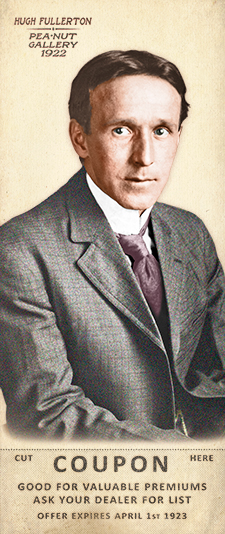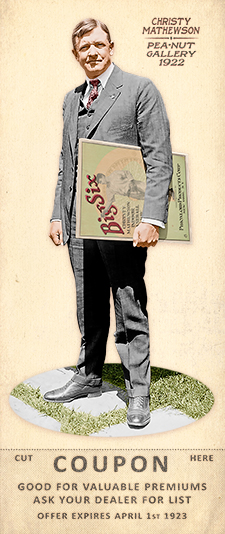- Series: 1919 Black Sox Scandal
- Hall: National Baseball Hall of Fame
Christopher Mathewson (1880-1925) was the consummate right hander of the early 20th Century. His “fadeaway” pitch baffled NL hitters from 1900-16. Mathewson won 22+ 12 straight years, 30+ 4x, and holds the modern NL record with his 37 wins in 1908. He hurled 3 shut-outs in 6 days to gain his sole world championship in 1905.
- One of the “first five” into Cooperstown
- Accomplished all this while honoring his Christian faith by not pitching on Sundays
- This Pilgrims card duplicates and preserves the uncorrected spelling error on Mathewson's original T201 Mecca card
- Elected to Hall of Fame: 1936

- Series: 1919 Black Sox Scandal
- Hall: J.G. Taylor Spink Award Recipient
Hugh Stuart Fullerton III (1873-1945) was one of the most respected sports journalists of the early twentieth century, introducing colloquial language and a human interest slant to the field. He was a mentor to at least two other all-time great sports scribes: Ring Lardner and Grantland Rice. He established his keen analysis of baseball stats early on when he projected one of the greatest World Series upsets, calling the 1906 tourney for the woeful-hitting White Sox over the 116-game winning Cubs in a crosstown rivalry for the ages. Yet, it wasn’t Fullerton’s on-field acumen that indelibly stamped his legacy on the game. The character-trait that shone most clearly was his integrity and zeal for the honor of the national pastime when, in 1919, Hugh refused to do what most in and outside the game did that year: duck and cover.
In blowing the whistle on what came to be known as the Black Sox scandal, Fullerton, aided by his ally Christy Mathewson, used his articles in the Chicago Herald-Examiner as a claxon, forcing the nation to face the existential threat posed by the vast network of underworld gamblers preying on players and the game itself. It took a year before his and Matty’s efforts bore fruit but, eventually, despite a widespread conspiracy of silence, charges were filed and eleven players were banned from baseball for life. No one was ever convicted of a crime, largely due to evidence that vanished quicker than a magician’s coin. Hugh was credited with shining the purifying light of investigative journalism at its finest on the threat. Baseball historian David Q. Voigt said, “In 1919 it was Fullerton’s detective work that unraveled the web of fact and rumor and exposed the crooked work of the Black Sox.” In a 1932 retrospective, Westbrook Pegler commented on the uniqueness of Fullerton’s contribution: “The fake world series of 1919 produced some of the worst newspaper reporting that the American press ever has been guilty of, and while all of us who were detailed to cover the show were not fired for missing the greatest sport story in 20 years is something that I have never understood. We were terrible.”
- Mathewson had covered the Series for a New York paper. He became Fullerton’s “expert witness,” parsing each key play for signs of wrongdoing
- Fullerton was a founder of the Baseball Writers Association of America. He is credited as the first of his field to include direct quotes of players in his coverage of the sport
- Elected to the Hall of Fame for Sportswriters via his selection for the J.G. Taylor Spink Award in 1946

